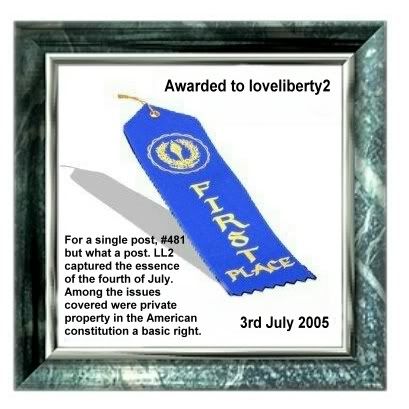
An emphasis on the Supreme Court is an appropriate subject for discussion today, because that Court-- and its strict interpretation of the document which Adams and the others intended to protect our liberty--is crucial to the freedom of future generations.
Recent decisions on freedom of religious expression and citizens' private property rights are examples of decisions that threaten freedom and harbor the seeds of a return to tyranny.
"Our Ageless Constitution," Bicentennial Edition (1987), outlined principles underlying the Constitution of the United States, one of which it titled, "Private Property Rights." Another section of this Bicentennial Volume, laid out by outstanding constitutional scholars, dealt with the 200-year history of court and legislative decisions that already had seriously eroded those principles.
One essay is reprinted below, with permission:
"Private Property Rights -- A basic Premise Of America's Constitution"
"Tired of having the fruits of their labors confiscated by an overpowering British government, America's Founders declared themselves free and independent.
"Most American schoolchildren can recite their claim that '. all men are endowed by their Creator with certain unalienable rights ... to life, liberty, and the pursuit of happiness.' Less familiar, however, are these lines from their Declaration of Independence:
"'He ( King George III ) has erected a multitude of new offices, and sent hither swarms of officers to harrass our people, and eat out their substance .... He has combined with others to subject us, ... imposing taxes on us without our consent.'
"What, then, did the Founders consider to be the real cornerstone of man's liberty and happiness? On what basic premise did they devise their Constitution? Let them speak for themselves:
"John Adams: 'The moment the idea is admitted into society that property is not as sacred as the laws of God ... anarchy and tyranny commence. PROPERTY MUST BE SECURED OR LIBERTY CANNOT EXIST.'
"James Madison: 'Government is instituted to protect property of every sort .... This being the end of government, that is NOT a just government,... nor is property secure under it, where the property which a man has ... is violated by arbitrary seizures of one class of citizens for the service of the rest.'
"Their guiding principle was that people come together to form governments in order to SECURE their rights to property - not to create an entity which will, itself, 'take from the mouths of labor the bread it has earned.' What was wrong for individual citizens to do to one another, they believed, was equally wrong for government to do to them.
"The right to own property and to keep the rewards of individual labor opened the floodgates of progress for the benefit of the entire human race. Millions have fled other countries to participate in the Miracle of America."
End of quoted material. Underlining emphasis added
As homes and schools have failed to study, understand, teach, and pass on the principles which produced a constitutionally limited power in the various levels of government, we see the constitution's protections eroded.
The 'redistribution of wealth' advocates of the past several decades, some of whom were dedicated to other philosophies, but many of whom were well-intentioned but ignorant of founding ideas, have provided a gate by which tyranny and oppression threaten liberty. This Court's decision simply has reinforced that oppresive idea.
America's Founders understood the human tendency to abuse power, and they meant for both elected and unelected persons with delegated power to be bound down by the "chains" (Jefferson) of the constitution. It is up to our courts, especially our Supreme Court, to heed Jefferson's admonition:
"On every question of construction, carry ourselves back to the time when the Constitution was adopted, recollect the spirit manifested in the debates, and instead of trying what meaning may be squeezed out of the text, or invented against it conform to the probable one in which it was passed."
As late as 1968, Justice Hugo Black's words constitute another wise warning:
"The public welfare demands that constitutional cases must be decided according to the terms of the Constitution itself, and not according to judges' view of fairness, reasonableness, or justice. I have no fear of constitutional amendments properly adopted, but I do fear the rewriting of the Constitution by judges under the guise of interpretation."
Ideas have consequences (Weaver)! The Founders ideas, summarized in the foregoing quotations, produced liberty and plenty: the idea exemplified by the Court's recent ruling allowing "arbitrary (property) seizures of one class of citizens for the service of the rest" is, as Madison asserted, not the idea of a JUST government. Its consequences are, as Adams declared, "anarchy and tyranny." Perhaps decisions that weakened public acknowledgement of the "sacredness" of the "Laws of God" contributed to the Court's willingness to intrude on property rights.
Great post.
We need to remember how it all started and celebrate it at least once a year if not more.
